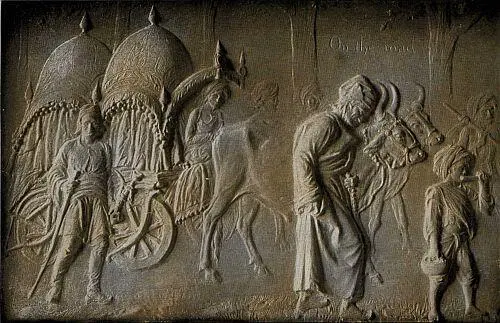'This is a good land—the land of the South!' said he. 'The air is good; the water is good. Eh?'
'And they are all bound upon the Wheel,' said the lama. 'Bound from life after life. To none of these has the Way been shown.' He shook himself back to this world.
'And now we have walked a weary way,' said Kim. 'Surely we shall soon come to a parao (a resting-place). Shall we stay there? Look, the sun is sloping.'
'Who will receive us this evening?'
'That is all one. This country is full of good folk. Besides,'—he sunk his voice beneath a whisper,—'we have money.'
The crowd thickened as they neared the resting-place which marked the end of their day's journey. A line of stalls selling very simple food and tobacco, a stack of firewood, a police-station, a well, a horse-trough, a few trees, and, under them, some trampled ground dotted with the black ashes of old fires, are all that mark a parao on the Grand Trunk; if you except the beggars and the crows—both hungry.
By this time the sun was driving broad golden spokes through the lower branches of the mango trees; the parakeets and doves were coming home in their hundreds; the chattering, gray-backed Seven Sisters, talking over the day's adventures, walked back and forth in twos and threes almost under the feet of the travellers; and shufflings and scufflings in the branches showed that the bats were ready to go out on the night-picket. Swiftly the light gathered itself together, painted for an instant the faces and the cart-wheels and the bullocks' horns as red as blood. Then the night fell, changing the touch of the air, drawing a low, even haze, like a gossamer veil of blue, across the face of the country, and bringing out, keen and distinct, the smell of wood-smoke and cattle and the good scent of wheaten cakes cooked on ashes. The evening patrol hurried out of the police-station with important coughings and reiterated orders; and a live charcoal ball in the cup of a wayside carter's hookah glowed red while Kim's eye mechanically watched the last flicker of the sun on the brass tweezers.
 The Lama and Kim walked a little to one side; Kim chewing his stick of sugar-cane, and making way for no one under the status of a priest.
The Lama and Kim walked a little to one side; Kim chewing his stick of sugar-cane, and making way for no one under the status of a priest.
The life of the parao was very like that of the Kashmir Serai on a small scale. Kim dived into the happy Asiatic disorder which, if you only allow time, will bring you everything that a simple man needs.
His wants were few, because, since the lama had no caste scruples, cooked food from the nearest stall would serve; but, for luxury's sake, Kim bought a handful of dung-cakes to build a fire. All about, coming and going round the little flames, men cried for oil, or grain, or sweetmeats, or tobacco, jostling one another while they waited their turn at the well; and under the men's voices you heard from halted, shuttered carts the high squeals and giggles of women whose faces should not be seen in public.
Nowadays, well-educated natives are of opinion that when their womenfolk travel—and they visit a good deal—it is better to take them quickly by rail in a properly screened compartment; and that custom is spreading. But there are always those of the old rock who hold by the use of their forefathers; and, above all, there are always the old women,—more conservative than the men,—who toward the end of their days go a pilgrimage. They, being withered and undesirable, do not, under certain circumstances, object to unveiling. After their long seclusion, during which they have always been in business touch with a thousand outside interests, they love the bustle and stir of the open road, the gatherings at the shrines, and the infinite possibilities of gossip with like-minded dowagers. Very often it suits a long-suffering family that a strong-tongued, iron-willed old lady should disport herself about India in this fashion; for certainly pilgrimage is grateful to the Gods. So all about India, in the most remote places, as in the most public, you find some knot of grizzled servitors in nominal charge of an old lady who is more or less curtained and hid away in a bullock-cart. Such men are staid and discreet, and when a European or a high-caste native is near will net their charge with most elaborate precautions; but in the ordinary haphazard chances of pilgrimage the precautions are not taken. The old lady is, after all, intensely human, and lives to look upon life.
Kim marked down a gaily ornamented ruth or family bullock-cart, with a broidered canopy of two domes, like a double-humped camel, which had just been drawn into the parao. Eight men made its retinue, and two of the eight were armed with rusty sabres—sure signs that they followed a person of distinction, for the common folk do not bear arms. An increasing cackle of complaints, orders, and jests, and what to a European would have been bad language, came from behind the curtains. Here was evidently a woman used to command.
Kim looked over the retinue critically. Half of them were thin-legged, gray-bearded Ooryas from down country. The other half were duffle-clad, felt-hatted hillmen of the North: and that mixture told its own tale, even if he had not overheard the incessant sparring between the two divisions. The old lady was going south on a visit—probably to a rich relative, most probably to a son-in-law, who had sent up an escort as a mark of respect. The hillmen would be of her own people—Kulu or Kangra folk. It was quite clear that she was not taking her daughter down to be wedded, or the curtains would have been laced home and the guard would have allowed no one near the car. A merry and a high-spirited dame, thought Kim, balancing the dung-cake in one hand, the cooked food in the other, and piloting the lama with a nudging shoulder. Something might be made out of the meeting. The lama would give him no help, but, as a conscientious chela, Kim was delighted to beg for two.
He built his fire as close to the cart as he dared, waiting for one of the escort to order him away. The lama dropped wearily to the ground, much as a heavy fruit-eating bat cowers, and returned to his rosary.
'Stand farther off, beggar!' The order was shouted in broken Hindustanee by one of the hillmen.
'Huh! It is only a pahari' (a hillman), said Kim over his shoulder. 'Since when have the hill-asses owned all Hindustan?'
The retort was a swift and brilliant sketch of Kim's pedigree for three generations.
'Ah!' Kim's voice was sweeter than ever, as he broke the dung-cake into fit pieces. 'In my country we call that the beginning of love-talk.'
A harsh, thin cackle behind the curtains put the hillman on his mettle for a second shot.
'Not so bad—not so bad,' said Kim with calm. 'But have a care, my brother, lest we—we, I say—be minded to give a curse or so in return. And our curses have the knack of biting home.'
The Ooryas laughed; the hillman sprang forward threateningly; the lama suddenly raised his head, bringing his huge tam-o'-shanter cap into the full light of Kim's new-started fire.
'What is it?' said he.
The man halted as though struck to stone. 'I—I—am saved from a great sin,' he stammered.
'The foreigner has found him a priest at last,' whispered one of the Ooryas.
'Hai! Why is that beggar-brat not well beaten?' the old woman cried.
The hillman drew back to the cart and whispered something to the curtain. There was dead silence, then a muttering.
'This goes well,' thought Kim, pretending neither to see nor hear.
'When—when—he has eaten,'—the hillman fawned on Kim—'it—it is requested that the Holy One will do the honour to talk to one who would speak to him.'
Читать дальше

 The Lama and Kim walked a little to one side; Kim chewing his stick of sugar-cane, and making way for no one under the status of a priest.
The Lama and Kim walked a little to one side; Kim chewing his stick of sugar-cane, and making way for no one under the status of a priest.










